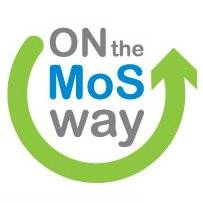In the framework of the European project “SUMPORT – Sustainable Urban Mobility in MED Port Cities”, co-financed by the Interreg MED program, the Valenciaport Foundation, with the collaboration of Autoridad Portuaria de Valencia (APV – Valenciaport, Port Authority of Valencia)the Port Authority of Valencia (APV) and the Ships, leads a pilot test called “E-Bike Sharing System at the Port of Valencia”.
This pilot, which consists of the start-up of a rental service for electric bikes for cruise passengers from the Port of Valencia, opens today with the arrival of the MSC DIVINA cruise. It consists of 10 electric bicycles – brand KYMCO – and an automatic parking where the bikes will be recharged with solar energy. The bicycle parking is located in the vicinity of the passenger terminal of Trasmediterránea and is a new connection between the port and the centre of the city. This service will be available from today and until the end of the pilot’s 5-month duration.
Likewise, within the framework of SUMPORT, the Valenciaport Foundation, in collaboration with the APV, is updating the Sustainable Mobility Plan of the Port of Valencia. One of the first actions that have been carried out has been the realization of a study of “Wayfinding” to improve pedestrian and vehicular signage within the port. As a first result, the APV has installed a totem with a built-in map and 5 directional signs to guide passengers on the itinerary from the Trasmediterránea terminal to the bus stop of the EMT that will direct them both to the centre and to the City of Arts and Sciences.
The SUMPORT project, which is co-financed by the Interreg MED program, has a total budget of almost 2.4 million euros and will end in 2019. The main objective of this project is to improve planning capacities in sustainable mobility in port cities through training activities and exchange of experiences. As a result, the port cities participating in the project (Durres, Limassol, Kotor, Igoumenitsa, Koper and Valencia) will develop or update their own Sustainable Urban Mobility Plans. Likewise, said cities will implement and simulate pilot actions in which they will try different types of measures such as bicycle lanes, shared bicycle systems, carpooling or ICT applications for public transport systems, in the field of sustainable mobility with a concrete impact on the daily life of citizens. The Valencian consortium of the project is formed by the Valenciaport Foundation and Las Naves as partners and the Port Authority of Valencia as a partner
Source: Portseurop

